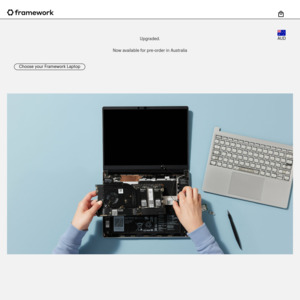Have read a few reviews, particularly regarding repair-ability. The concept of being able to easily upgrade or replace failed components seems to be a more sustainable model.
Has anyone ordered one, or even had one delivered?
What was the ordering/purchasing experience like?
Website https://frame.work/au/en
Ifixit review https://www.ifixit.com/News/51614/framework-laptop-teardown-…

I keep looking at Frameworks every now and then but I'm still shy about whether it's something to buy. (Am I'm grumpy that the expansion card for the USB-A only turns it into one slot and not two slots.)
That said, checked the website linked there and there's an awful lot of "Coming soon" plastered all over everything in their shop…